|
As a young adult active in the life of my parish and diocese, I am often asked why I “do what I do.” The even better question I am frequently (but usually jokingly) asked is, “What is wrong with you?!” These questions are typically posed by the “church ladies” that will often comment on my bright red hair and then go on to lament the fact that their children or grandchildren do not attend Mass on Sundays.
I find these conversations to be great times for evangelization, and I try to respond with a question of my own: “When was the last time you asked them to come with you?” A blank face usually stares back at me. As Catholics, inviting someone to go to Mass with them is often a foreign concept. For many of us (myself included), faith is a very personal thing, and the thought of wearing it on our sleeves is not necessarily the most comfortable. Perhaps the Season of Advent that we will begin on Sunday is the perfect opportunity to invite a friend, family member, or neighbor back to the practice of their faith. As we wrestle between the Season of Advent and the secular Christmas season, it might be helpful to view our lives as Christians as a perpetual Advent, as a constant rebirth. The Advent that we seek is something new, something filled with the grace of rejuvenation through the working of the Holy Spirit. The mission of baptized Christians is to believe, practice, and teach the truths of the faith. Responding to this call in a responsible and proactive way is often the problematic or challenging part to living out the task of evangelization. The picture of faith that we often paint for ourselves is frequently an illusion of what we desire out of our own human weakness. If faith lacks substance, Pope Benedict XVI has said that our individual faith “will not be big enough to cope with reality.” If we believe that a sign will fall from the heavens with the answers to our questions of faith, then we are missing the signs that God provides for us each and every day. In its authenticity, true faith should be given out of love for God and with the confidence that God does not need our praise and thanksgiving. Although we trust in a God that we cannot see, we believe in the Advent of a renewing and fulfilling redeemer whose Church should be compelled to evangelize and spread the message of salvation. My challenge to you as we begin this Season of Advent is this: Invite someone to go to Mass with you. Smile. Listen to some Christmas music. Put some pocket change in the bell ringer’s bucket for charity. “Prepare the way of the Lord” (Mk 1:3) and “be vigilant at all times” (Lk 21:36). A blessed Advent to you and yours! Grant your faithful, we pray, almighty God, the resolve to run forth to meet your Christ with righteous deeds at his coming, so that, gathered at his right hand, they may be worthy to possess the heavenly Kingdom. Through our Lord Jesus Christ, your Son, who lives and reigns with you in the unity of the Holy Spirit, one God, for ever and ever. -Collect, First Sunday of Advent Alex R. Boucher is the Program & Operations Coordinator for the Catholic Apostolate Center. Follow Alex on Twitter at @AlexBoucher.
0 Comments
It is no secret that when disaster strikes, human beings band together to take care of each other. Regardless of race, age, gender, or belief system people come together to help rebuild homes and people’s spirits. This held true in the wake of Hurricane Sandy: a hurricane that barreled up the eastern seaboard bringing destruction to parts of New Jersey and New York. Across the country, people held food and clothing drives to try and bring relief to the affected areas. In the midst of a tragedy faith, hope, and love were restored because of the actions of people across the country.
Thankfully, there was no damage done to my home when Hurricane Sandy hit, but some of my other friends were not as lucky. Their homes have been destroyed and all their memories have been washed away with the floodwaters. After talking to some of the people who did lose everything, they said their faith in humanity was restored through the charity of others. When they said it, I didn’t think much about it. But then I began to think of what the word charity and being charitable truly means. St. Francis of Assisi said, “Preach the Gospel, and if necessary, use words”. Charity is an action that embodies this idea. When sharing our faith and living out what it means to be a Catholic, we do not have to use words and preach to people. Instead, we can use actions to evangelize and show the world what it truly means to be a Catholic. Actions speak louder than words and this holds true for the New Evangelization. This has been true for years, but I have not seen it displayed as prominently as I have through the hurricane relief efforts. Regardless of age, people are pitching in and donating both time and money. Their actions are showing what it means not only to be charitable but also Christian. Young adults can use charity and Catholic Social Teaching to live out the New Evangelization not only during a time of crisis but during their everyday life. Catholic Social Teaching provides guidelines that people can use to live a just and moral life. Seven key themes of the Church’s social teaching include: life and dignity of the human person, call to family, community, and participation, rights and responsibilities, option for the poor and vulnerable, dignity of the rights of workers, solidarity and care for God’s creation. Catholic Social Teaching offers ways to live out our faith in everyday life and helps us in becoming tangible signs of Christ’s love. I tell my students everyday that what we learn in class does not stop when they walk out the door. We are all walking signs of God’s love and it is our mission to spread it to everyone. Through our actions let us work to restore faith, hope and love in our world and be part of this New Evangelization. Erin Flynn is a religion teacher at The Mary Louis Academy in New York. As we celebrate Thanksgiving, let us remember the need of gratitude in our spiritual lives. We share with you today a daily meditation on gratitude written by Henri Nouwen. He titled it “The Spiritual Work of Gratitude.”
To be grateful for the good things that happen in our lives is easy, but to be grateful for all of our lives-the good as well as the bad, the moments of joy as well as the moments of sorrow, the successes as well as the failures, the rewards as well as the rejections-that requires hard spiritual work. Still, we are only truly grateful people when we can say thank you to all that has brought us to the present moment. As long as we keep dividing our lives between events and people we would like to remember and those we would rather forget, we cannot claim the fullness of our beings as a gift of God to be grateful for. Let's not be afraid to look at everything that has brought us to where we are now and trust that we will soon see in it the guiding hand of a loving God. We at the Catholic Apostolate Center wish you a happy and blessed Thanksgiving Day. Know that you all are kept in our prayers this day and that we are grateful to be on this journey of faith with all of you. On Sunday, November 4, I couldn’t help but smile as I opened my hymnal for the opening procession. “Here in this place new light is streaming, now is the darkness vanished away.” The lyrics came so easily from my heart, words that I had sung as a little girl in the pew and now as a young woman working as a catechist for a parish community. From my first days settling into the rhythm of work in a parish office and transitioning from life as a student, I’ve made some new and unexpected friendships that have reflected this new light.
These unexpected friendships are those of the saints. Peter Kreeft writes, “A saint is a little Christ. Not only do we see Christ through His saints, as we see a light through a stained glass window, but we also understand the saints only through Christ...” At this stage in life, a state of transition, I have yearned for Christ in a new way. How do you become who you are in faith and Christ? That burning question has led me to the lives of extraordinary people who acknowledged their own light and sinfulness and transformed it in the light of Christ. I’ve grown to know Christ better through the face of Blessed Teresa of Calcutta, Therese of Lisieux, and Bernard of Clairvaux. I see him in Francis of Assisi, Francis de Sales and Elizabeth Ann Seton. These are only a handful of people who reflect what we call a communion of saints. The Catechism states, “We believe in the communion of all the faithful of Christ, those who are pilgrims on earth, the dead who are being purified, and the blessed in heaven, all together forming one Church” (CCC 962). The saints come together in union as the Body of Christ, each bringing their own sinfulness, challenges, joys and earthly life to the table. How amazing it is to know that there is a whole family in heaven feasting and praying for us on our own journeys! Their personalities and similarities to our own experiences remind us that we too are unique lights, finding our true selves in Christ. “For me to be a saint means to be myself,” writes Thomas Merton. And the message is echoed again in the song, “Gather us in...and we shall arise at the sound of our name.” Communion and sainthood begins with listening to Christ say our name and becoming more who we are meant to be in Him. Pope Benedict noted in his address on this past All Saints Day, “…being united to Christ in the Church does not negate one’s personality, but opens it, transforms it with the power of love and confers on it, already here on earth, an eternal dimension.” Saints are intimately bound to both heaven and earth, in their love and actions. I had to remember in my own transition how the journey of holiness is one set a part. None of these people were sinless, they struggled just like me, but the way that they rooted themselves in faith made all the difference. They lived a dynamic life, a faithful life with intensity as Pope Benedict remarked. The saints gathered, lived as “little Christs,” and beacons of light, because they knew of their final dwelling place in heaven. Live in the moment, because life is a constant transition. Trust that God carries you through that moment, and submit to his will in faith. Be fully alive, be fully yourself. We ask God to gather us in communion and holiness with these messages, remembering our friends, the saints. Sophie Jacobucci serves as an Echo Apprentice in the Diocese of Manchester, New Hampshire. In the shadow of last week’s election we are reminded that our citizenship does not exist in a vacuum of universal or unwavering agreement on social issues. Instead, we are empowered to raise our voices in opposition of or in agreement to any trending issue. You may be partisan, or not; controversial, or not; patriotic, or not. As Catholics, we are empowered to exist from a platform of universal participation in the human experience. We are reminded and called to be a Church of faith in action.
As Catholics we are given the gift of grace while at the same time inheriting the responsibility of caring for one another. Each day our lives are filled with many people, but how many of these people that surround us do we love fully? Can we say that we are truly pursing love with depth that Christ has given us? The Catechism of the Catholic Church challenges us that, "To receive in truth the Body and Blood of Christ given up for us, we must recognize Christ in the poorest, his brethren" (no. 1397). This week, as we find ourselves in the midst of National Hunger and Homelessness Awareness week, we are challenged to rekindle this charity that Christ models for us in the Paschal Mystery. Our inheritance in the kingdom of God and our lineage among the community of saints ask us to live charity in all that we do. But, I find myself asking, how can any one person love so completely, tirelessly, and compassionately? How can anyone ask this of an impatient waitress-social worker-jogger-cat owner-caffeine dependent- graduate student? As an individual, I cannot love like that. In the past day alone, I have acted without love more times than I am willing to admit. Why do I act so constantly without the intensity of love I was born to fulfill? First, I should drink less coffee: it agitates me and makes me much less loving. But second, we cannot alone achieve this life of charity. The Bishops remind us that, “Our commitment to the Catholic social mission must be rooted in and strengthened by our spiritual lives. In our relationship with God we experience the conversion of heart that is necessary to truly love one another as God has loved us.” God asks all of us to love with unending depth. It is only through working with one another, serving one another and celebrating one another that we may live and love in the depths for which we have been so created. With this great love, we will share our human experience. It is then that we will doubtlessly uncover the answers to our growing social inequities and ideological rifts and discover the underlying nature that connects us all. This week as we join with our nation to raise awareness of those most marginalized, let us rekindle charity and come to know Christ in our most vulnerable brothers and sisters. May we strengthening our spiritual lives in hopes of having a conversion of heart and begin to truly love another as God loves us. Samantha Alves is working toward a M.S.W. at Boston College and currently works for the Massachusetts Coalition for the Homeless. This past weekend, I had an opportunity to lead a day retreat for liturgical ministers at a local parish. It was a wonderful time of discussion, reflection and most importantly prayer. At one point amid our large group discussion I asked the question (much like Brett Garland in a recent post), “why are we Catholic in today’s society?” It was an unscripted, off-the-cuff question, but one that I thought would shed light on the importance of evangelization among the lay faithful. The answers were varied, but one stuck out in particular: an older woman said, “Because my parents were Catholic and raised me this way.” I challenged her to explain the answer by asking if her parents were the only reason she remained Catholic. Her answer was short and to the point: “No, my children are.”
The responses that this woman gave are two of the most basic, yet important teachings of our Catholic faith: “no one comes to faith alone” (CCC 166) and “we can’t give what we don’t have” (CCC 425). Throughout the history of the Church, we have seen time and again, that people bring others into relationship with God. Very rare are the days of the burning bush, but not so rare are the days of ordinary people leading others to the extraordinary truth that God exists. In my own life, I can credit my parents, campus ministers, members of my community, friends and now, my students, for helping me to discover God working in and throughout my life. It is with their witness (good and bad), their encouragement and their prayers that I have come to live my faith. What is even more telling, however, is that the faith we have is not ours to hoard. Our faith - that is our belief in a perfect, triune God who loves us unconditionally and is made present to us in the sacrifice of the Mass - is meant to be shared. For more than 2,000 years, the faith of our fathers has been handed on from generation to generation. Christ urged his disciples: “Go, therefore, and make disciples of all nations, baptizing them in the name of the Father, and of the Son, and of the Holy Spirit, teaching them to observe all that I have commanded you. And behold, I am with you always, until the end of the age” (Matthew 27:19-20). If every Sunday we profess belief in an ever-present God and we leave Mass with the intention to live our life transformed by His Word, then it is our obligation as baptized Catholics to share what we have been given. I’m reminded of a pertinent thought by Thomas Merton: “God has willed that we should all depend on one another for our salvation and all strive together for our own mutual good and our own common salvation.” Our faith and the faith of those around us should not be self-centered or self-contained, but rather, by virtue of our baptism, shared joyfully with every person we encounter. So, consider these thoughts: who has helped bring you to this point in your faith life? Have you thanked them for their witness, encouragement or prayers? And, when was the last time you shared your faith in an authentic and joyful way, so as to bring about “mutual good and our own common salvation?” Jonathan Jerome is the Director of Catholic Campus Ministry at the University of Pittsburgh Johnstown. “To see a world in a grain of sand, and a heaven in a wildflower/ hold infinity in the palm of your hand and eternity in an hour.” During my junior year at Chaminade High School, Bro. Stephen Balleta, S.M. drilled these hallowed words of William Blake deep into the recesses of my brain. I’ve kept that stanza from The Auguries of Innocence neatly tucked away, perhaps in the same aisle of my mind as the such and such causes for World War I, the date of the Battle of Hastings and when to use affect as opposed to effect.[1] Trivial though it may have seemed at the time, some six years later these words have finally manifested their power. William Blake, in that short, un-rhyming and jumbled stanza has captured what it means to see the world sacramentally.
The infinite world captured in a grain of sand, the boundless beauty expressed in a wildflower, the gift of holding infinity in the palm of our hand and the paradox of fitting eternity into one hour all capture (to the extent that human speech and thought are able to communicate and conceptualize) – the essence of sacramental nature. A sacramental worldview is less like viewing the world through rose colored glasses and more like journeying through space and time in Dr. Who’s TARDIS; the inside is exponentially larger than its external appearance implies. Somewhere alongside my knowledge of the Battle of Hastings and World War I is also a (working) definition of sacrament: a tangible sign of the invisible grace of God (cf. CCC 1131). Each of our seven sacraments has a clear and tangible sign (e.g. the bread and wine brought for consecration and the water and oil used in baptism) that manifests that salvific grace which is otherwise beyond the grasp of our senses. A sacramental worldview, however, should extend beyond the liturgical function of our seven sacraments; rather, it should extend the sacraments themselves. Living a sacramental worldview means, quite simply, viewing the world as sacrament. A redundant definition it might be, but often times the simplest explanations are the best. If we do truly believe that the Sacraments are moments in time where the invisible grace of God is made visible and tangible then seeing this same grace working constantly in and through our daily lives would only beg that we see the sacramental nature of daily life. This is not to say that every blade of grass is truly the transubstantiated body of Christ, but it does substantiate St. Ignatius’s charge to see God in all things. Furthermore, viewing the world through “sacramentally-tinted glasses” would mean seeing the very world itself as sacramental; it would mean recognizing our lives and everything that they contain as the gift that they are. Indeed, it would mean seeing this world, our fallen world, for what it truly is: a tangible sign of the invisible and salvific grace of God. That being said, the question is not so much what it means to live with a sacramental worldview, but rather how this worldview will change the way we act. Every grain of sand is a window to the self-giving and creative essence of our God, every wildflower a taste of His beauty; we hold infinity in the palm of our hands before the reception of the Most Blessed Sacrament and eternity in an hour with each liturgy. Perhaps the Brothers at Chaminade knew what they were doing after all. Patrick J Sullivan is working on his MA in theology at the University of Notre Dame through the Echo Faith Formation Leadership Program and is currently serving in the Archdiocese of Indianapolis. Decisions made in the voting booth are deeply personal and reflect a combination of our experiences and beliefs. And as Catholic American citizens, now is a critical time. The outcome of the presidential election will have far-reaching consequences and it is our responsibility to seriously consider our choice of leaders and policies that will guide our nation and our state.
Catholic voters are once again caught between their desire to participate in civic life and the choice of candidates for elected office falls short of a vision of the common good as rich and full as Catholic social teaching presents. Consequently, many have become subject to the mentality that being Catholic and politically active are incompatible. But this is not so. Catholics are called to understand and accept the Church’s teaching as a means of becoming more engaged in political life. It may be challenging, but it is something we have to wrestle with. At an address this past month, Archbishop Chaput of Philadelphia said, “We believe in the separation of Church and State, but that is not the same thing as separation between faith and politics. Faith is what we believe, politics is how we act.” He advised Catholics to “apply the principles of Catholic social teaching – such as the common good and subsidiarity”, to their voting decisions. We have the duty as citizens to participate in our own governments for the sake of the common good. By not doing so, we abandon the political process and risk unjust laws being formed. Poorly formed legislation and leadership may come about anyway, but it should not come about as the result of Catholics disregarding the process. Casting an informed vote is one of the best things we as Catholic citizens can do for our country. It is the duty of citizens to contribute – along with the civil authorities – to the good of society in a spirit of truth, justice, solidarity and freedom. “The love and service of one’s country follow from the duty of gratitude and belong to the order of charity" (CCC 2239). And so as Catholic citizens, we enlighten and develop our consciences as citizens in accordance with the principles of Catholic Social Teaching. One straightforward and immediate way Catholic voters can make a meaningful contribution to public discourse is to draw the larger public’s attention to issues that are essential to Catholic social thought. The most essential of these is the dignity of every human person and each one’s basic right to life from conception to natural death. Respect for human dignity has an essential role in the respect of all human life, especially the fundamental right to life. It is a natural principle that is supported by our beliefs; it is our faith, as His Holiness states in Porta Fidei, that “opens our eyes to human life in all its grandeur and beauty.” As Catholic voters, we have to see ourselves as bridge builders. According to Bishop Richard Pates of Des Moines, Iowa, and Chairman of the Committee on International Justice and Peace for the USCCB, “The Catholic vision is one of collaboration, not coercion, among individuals, governments, businesses and other institutions.” Voting in this election is not based on profit or having a winning ideology. Our “Catholic vision” is one that creates an environment in which all people can develop and ultimately flourish. Along with tens of millions of fellow citizens, I urge you, Catholic voters, to cast your ballot today. Commit yourself to creating conditions that fully respect the dignity God has bestowed upon all of us. Our political responsibility doesn't stop at the polls this Election Day. We must always respond to the social issues, locally and nationally, that affect the dignity in which we are all created. Sarah Morris is a senior Politics major at The Catholic University of America. As a Catholic school student in the fifth grade, I learned about the “cult of the saints.” I remember being extremely confused at the time, as I had no idea what the phrase meant, and I don’t think it was ever actually explained to us. In preparation for All Saints Day, we were tasked with choosing a saint and writing an essay about them. After wide consultation amongst family members, I chose St. Jude Thaddeus, the patron saint of hopeless cases. Perhaps this was my family’s way of saying that I was a hopeless case at the age of 10, but I digress.
A dozen or so of us lucky students who wrote superb essays were chosen not only to present our essays in front of the classroom, but also to dress up like our sainted friend and read the essay at the conclusion of All Saints Day Mass at the parish church. I set off to find out what St. Jude looked like. Flowing robes and lots of green fabric. Without asking my mother to dig out the old photo albums, let’s just say that it happened, and that the experience got me hooked on the “cult of the saints.” Today we celebrate the Solemnity of All Saints. This celebration includes the many saints and blessed “who have gone before us with the sign of faith” (Roman Canon), in addition to both the ordinary and extraordinary who intercede for us daily in Heaven but who have not officially risen to the “dignity of the altar.” These holy women and men serve as examples of how to live, love, and serve the world around us. We are all called to love, and we are all called to be saints. As a priest said during a homily while I was on vacation this summer, “To become a saint isn’t to become a statue. It is to become real.” Through living out the love that Christ showed us on the cross and by emulating those who have gone before us, we all assist in building up the Body of Christ. In Pope Benedict XVI’s homily on All Saints Day in 2006, he said, “Holiness demands a constant effort, but it is possible for everyone because, rather than a human effort, it is first and foremost a gift of God, thrice Holy.” If holiness is a gift from God – Father, Son, and Holy Spirit – it is our responsibility to strive for holiness in order to be, as the priest prays during the Roman Canon, “counted among the flock of those [God] has chosen.” As an Anglophile and lover of English hymnody, I leave you with this. Enjoy, and blessed Solemnity of All Saints! Alex R. Boucher is the Program & Operations Coordinator for the Catholic Apostolate Center. Follow Alex on Twitter at @AlexBoucher. |
Details
Archives
July 2024
Categories
All
|
About |
Media |
© COPYRIGHT 2024 | ALL RIGHTS RESERVED


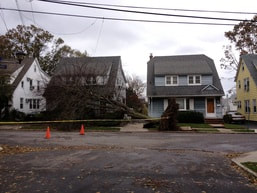

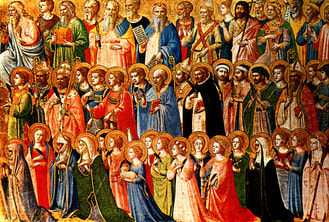
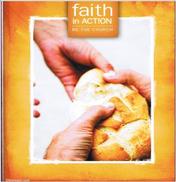
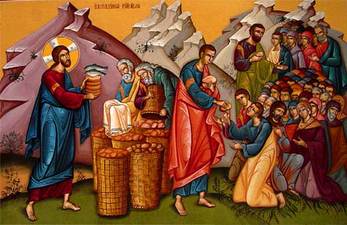
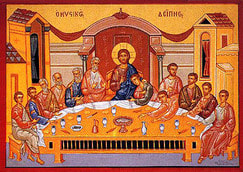
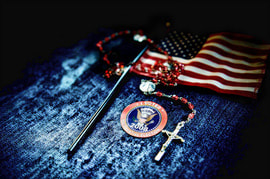
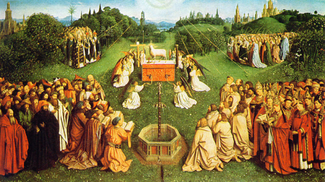
 RSS Feed
RSS Feed